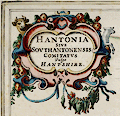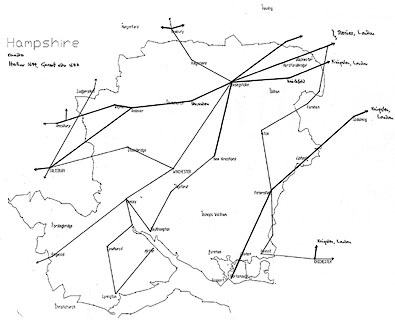
|
Research Notes
 Map Group HOLLAR 1644
Map Group HOLLAR 1644
|
 |
|
Hollar 1644
|


|
|
|
Mappe of Kent, Southsex, ... etc, scale about 6 miles to 1 inch, the SE sheet of
the Quartermaster Map, by Wenceslaus Hollar, published by Thomas Jenner, London,
1644; published 1644-1799.
|
|
|
These notes for Hampshire are taken from a map in the John
Garrett edition, London, 1688. The map studied is in a private
collection.
|
|
The map includes Hampshire, scale about 7 miles to 1 inch.
The map size is: wxh, sheet = 51x33.5cm; wxh, map = 508x272mm.
Remember that these notes are for Hampshire, and ignore many
other parts of the map.
|
 |
PUBLISHING HISTORY |
 |
MAP FEATURES |
 |
REFERENCES |
 |
ITEMS in the Collection |
 |
|
| PUBLISHING |
HISTORY |
|
The map is said to be based on Christopher Saxton's large wall
map of England and Wales, 1583:-
|
|
Britannia Insularum in Oceano Maximo
|
|
which was engraved in 20 sheets at a scale of about 8 miles to
1 inch; total size about 5x4 feet. Wenceslaus Hollar was engaged
by Thomas Jenner to engrave a version, which Jenner published in
6 folded sheets as a booklet, at about 7 miles to 1 inch. It was
described as:-
|
|
The Kingdome of England & Principality of Wales exactly described
... in six maps, portable for every man's pocket.
|
|
As long as you have large pockets!
|
|
The map was described in a preface as:-
|
|
Useful for all Com~anders for Querteringe of Souldiers & all
sorts of Persons that would be informed, Where the Armies be;
never so commodiously drawne before this, 1644.
|
|
The map was issued again by Jenner, 1671, with some roads
added. Published with roads added by John Garrett, Royal Exchange, London,
1675 on silk, 1676 and 1688.; and
by John Rocque, London, 1752 and 1799.
|

| top of page |
 |
|
| MAP FEATURES |
|
plain cartouche
title cartouche
publisher
|
Printed lower right in a plain cartouche:-
A MAPPE OF KENT, SOUTHSEX, SURREY,
MIDdlesex, Barke and Southampton Shire & the Ile of Wight, part
of Essex & Wiltshire etc.
Printed lower middle is:-
Printed Coloured and Sold by John
Garrett at the South Entrance of the Royall Exchange in
London.
|
orientation
compass rose
up is N
|
Printed lower middle is a compass rose; star points for
cardinal and half cardinal directions, lines for false and by
points, North marked by a fleur de lys, E S and W labelled. The
map is printed with North at the top of the sheet.
|
scale line
scale
old english mile
|
Printed below the title lower right is a scale of:-
English Miles
chequered in miles, labelled at 5 miles intervals. The 20
miles = 84.8 mm giving a scale 1 to 379401 wrongly assuming that
the miles are statute miles. The map scale is (wrongly):-
1 to 380000
6 miles to 1 inch
A much more reliable estimate is got from measuring the
positions of towns and comparing these to known positions. This
has been done for the Hampshire area using DISTTAB.exe software,
source file:-
see:- HOL1DIS.txt
The map scale is about 1 to 456826 +-8%. The map scale is
about:-
1 to 460000
7 miles to 1 inch
The measurement provides an estimate of the miles used in the
map, the Old English Mile:-
1 map mile = 1.21 statute miles
|
sea area
sea plain
ships
|
The sea area is plain, with some sea areas labelled, eg:-
Spitt head
in this area there are moored two 3 masted ships, their sails
furled.
|
coast line
coast shaded
harbours
|
The coast line is emphasised by shading, which is tinted blue.
The is crudely drawn but well enough to recognise the harbours
and estuaries in the Hampshire area, where a couple of harbours
are labelled:-
Lemington haven
Hamble haven
Bouley haven
The last is perhaps Beaulieu, but is labelled off the mouth of
the River Meon.
|
rivers
bridges
|
Rivers are drawn by a double, narrowing to a single, wiggly
line tapering inland. A few rivers are labelled, eg:-
Avon flu.
Test river
All Hampshire main rivers are shown, with a number of
tributaries.
The original map had no bridges, but this later edition has
some bridges drawn by a double line across a stream. Bridges do
not relate to the roads, which are also later additions to the
map.
|
relief
hillocks
|
Groups of hillocks, some with shading to the east, indicate
some relief. Ranges of hills between Christchurch and Ringwood,
north of Lyndhurst, north east of Petersfield, and north of
Winchester, are shown. This is not a good guide to the shape of
the county. No hills in Hampshire are labelled.
|
beacons
|
North of Exton is a shaded hillock, on the west flank a tree,
on top a drawing of a beacon, labelled:-
Lomerash
The beacon is a post, with a ladder, and a cross bar from
which dangles a fire basket.
|
woods
forests
trees
|
Tree symbols are used to indicate woodland.
the new forest
has dense groups of trees in parts, as have:-
Walthm Forest
Est. Beare Forest
Chute forest
the last drawn in Wiltshire. North of Liphook is:-
Wulmere forest
without trees, which is roughly correct.
|
county
|
County boundaries are a dotted line, the county areas are
labelled, eg:-
SOUTH HA~P TON SHI RE
spread about the area. Text placement is not one of the charms
of this map! The boundaries are tinted on the county's side;
Hampshire red, Dorset orange, Wiltshire yellow, Berkshire orange,
Surrey yellow, Sussex, orange. The tints are faded, and may have
been misinterpreted.
|
|
The detached part of Hampshire in Sussex is not noticed.
|
settlements
|
Settlements are marked by a circle, perhaps with towers etc,
differentiated by style of lettering.
|
city
town
|
circle and tower and buildings; labelled in ?italic block
caps, in Hampshire:-
WINCHESTER
SOUTHAMPTON
|
|
town
|
circle and tower and buildings; labelled in upright lowercase
text, eg:-
Aulto~
Andover
|
|
|
|
village
|
circle; labelled in italic lowercase text, eg:-
Upwallop
Selborne
|
roads
|
Roads were not drawn on the original map. Editions from about
1675 (when John Ogilby published his road book) have roads added.
They are, not very neatly engraved, drawn by double or single
lines for greater and lesser roads. While the Lands End and the
Barnstaple roads, and the Portsmouth Road are similar, but not
the same, to John Ogilby's routes, other main routes are
different. The main routes relevant to Hampshire are:-
from London; via Staines, Middlesex;
(north of Bagshot, Surrey); then (north of Blackwater),
Basingstoke, Steventon, (south of Whitchurch), Andover, Quarley,
(north of the Wallops), Hampshire; to Salisbury, Wiltshire; and
westward to ?Lands End.
branch from Andover, through Weyhill,
Hampshire; to Amesbury, Wiltshire; continues as a lesser route.
branch from Basingstoke to Alresford,
Hampshire.
from London; via Staines, Middlesex;
across a corner of Surrey; across part of Berkshire; to
Basingstoke, Hampshire, entering the county north of Heckfield.
from London; via Kingston, Surrey; then
Winchfield, to Basingstoke, Hampshire, entering the county near
Frimley.
from London; via Guildford and
Godalming, Surrey; then Petersfield, (Horndean and Cosham not
marked on map), to Portsmouth, Hampshire.
|
| Route diagram:- |

|

| top of page |
 |
|
| REFERENCES |
|
|
Shirley, Rodney W: 1980 (revised
edn): Early Printed Maps of the British Isles 1477-1650: Antique
Atlas Publications
|
 |
|
|
ITEMS |
in HMCMS Map Collection and Private Collections (scanned item in bold)
|

|
private collection (36) -- map
|

| top of page |
|
 |
All Old Hampshire Mapped Resources |

 Map Group HOLLAR 1644
Map Group HOLLAR 1644
















